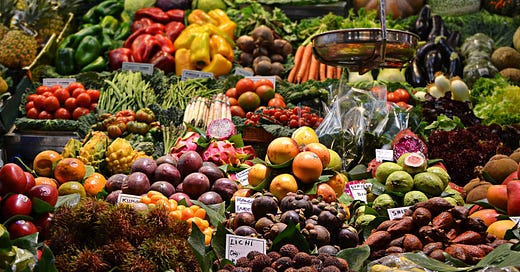The plant-based movement has surged in popularity over the past decade, with more people worldwide embracing vegetarian and vegan lifestyles for health, environmental, and ethical reasons. Once considered niche, plant-based diets have now become mainstream, influencing food industries, restaurant menus, and consumer habits across the globe. From vegan fast food chains to plant-based alternatives in supermarkets, the shift is undeniable. But what is driving this movement, and how is it shaping the future of food?
1. Why Are More People Going Plant-Based?
Health Benefits of a Plant-Based Diet
Numerous studies highlight the health benefits of a vegetarian or vegan diet, including:
- Reduced risk of heart disease – Plant-based diets are lower in saturated fats and cholesterol.
- Lower chances of type 2 diabetes – Whole, plant-based foods help regulate blood sugar.
- Improved digestion – Diets rich in fiber support gut health.
- Potential weight loss – Vegan and vegetarian diets are often lower in calories and processed foods.
The World Health Organization (WHO) has also recommended reducing meat consumption to lower the risk of chronic diseases.
Environmental Concerns Driving Change
The environmental impact of animal agriculture is another major factor behind the shift. Reports indicate that:
- Livestock farming contributes to nearly 15% of global greenhouse gas emissions.
- Meat production requires significantly more water and land compared to plant-based alternatives.
- Deforestation and biodiversity loss are accelerated by animal agriculture.
As consumers become more aware of their carbon footprint, they are opting for eco-friendly diets to contribute to sustainability.
Ethical and Animal Welfare Considerations
The rise of documentaries and social media awareness has also fueled the movement. Many people are choosing vegan or vegetarian lifestyles to stand against factory farming, animal cruelty, and unethical food production practices.
2. The Rise of Plant-Based Alternatives
Vegan Meat and Dairy Alternatives
The vegan food industry is booming, with major food companies investing in plant-based alternatives. Innovations in food technology have led to:
- Plant-based meat brands like Beyond Meat and Impossible Foods, which mimic real meat.
- Dairy-free milk options, such as almond, oat, and soy milk, replacing traditional dairy.
- Egg substitutes made from chickpeas, mung beans, and flaxseeds.
Fast Food Chains and Restaurants Going Plant-Based
Leading fast-food chains and restaurants are catering to the plant-based demand:
- McDonald’s introduced the McPlant burger in multiple countries.
- Burger King offers plant-based Whoppers and vegan nuggets.
- KFC now serves plant-based chicken alternatives.
Even fine-dining restaurants are creating gourmet vegan dishes, elevating plant-based cuisine to a new level.
3. The Cultural Shift Toward Plant-Based Diets
Regional Growth in Veganism
While plant-based diets have deep cultural roots in India, China, and parts of the Mediterranean, Western nations are now seeing rapid adoption:
- Germany and the UK lead Europe in vegan product launches.
- The U.S. has witnessed a 600% increase in veganism over the past five years.
- Asian countries are modernizing traditional plant-based diets with innovative alternatives.
The Role of Social Media and Influencers
Social media platforms like Instagram, TikTok, and YouTube are promoting plant-based lifestyles through:
- Vegan influencers and celebrities endorsing cruelty-free living.
- Recipe-sharing communities making plant-based eating more accessible.
- Viral trends like #MeatlessMonday, encouraging people to reduce meat consumption.
4. Challenges and Criticisms of the Plant-Based Movement
Nutritional Concerns
Critics argue that plant-based diets may lack essential nutrients, such as:
- Vitamin B12 – Primarily found in animal products.
- Iron and Zinc – Found in meat but also available in plant sources like lentils and nuts.
- Omega-3 Fatty Acids – Often sourced from fish but available in chia seeds and flaxseeds.
Proper meal planning and fortified foods can help address these concerns.
Price and Accessibility
While plant-based food options are expanding, vegan and organic products can be expensive. Some regions still face limited availability of plant-based options, though affordability is improving as demand grows.
5. The Future of Plant-Based Diets
With advancements in food technology and increasing consumer demand, the plant-based revolution is here to stay. Future trends may include:
- Lab-grown meat and precision fermentation to create ethical and sustainable alternatives.
- More government initiatives supporting plant-based diets for health and environmental benefits.
- Wider adoption of plant-based menus in schools, hospitals, and corporate cafeterias.
As more people recognize the health, environmental, and ethical benefits of plant-based diets, the world is moving toward a greener, more sustainable food future.
The plant-based revolution is not just a passing trend—it is a global shift toward healthier, more ethical, and sustainable eating habits. Whether someone chooses to go fully vegan or simply reduces their meat consumption, every small change contributes to a larger impact. With innovation, accessibility, and cultural acceptance on the rise, the future of food is looking plant-powered.










